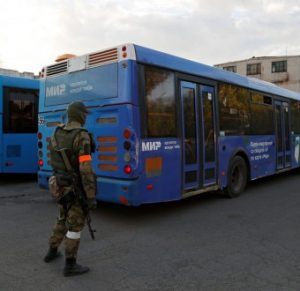
Russia’s Defense Ministry has said that almost 2000 Ukranian soldiers have surrendered at Azovstal, the last stronghold of Ukranian forces in the Mariupol region.
Azovstal was the last holdout in Russian-occupied Mariupol and became a symbol of Ukrainian resistance despite facing relentless Russian military bombardment.
Earlier this week, the Ukrainian military said the country’s forces had completed their “combat mission” in Mariupol, according to a statement by the country’s military, bringing the months-long battle for the besieged city close to an end.
Western intelligence believe there are still hundreds of soldiers at Azovstal but it’s unclear whether or when they will leave the plant and what negotiations may be going on between Ukraine and Russia as per the fate of the soldiers.
In remarks carried by Russian state media Friday, May 20, Russia’s Defence Minister, Sergei Shoigu said:
“The blocking of the Azovstal plant continues … Nationalists are actively surrendering to captivity. At the moment, 1,908 people laid down their arms.”
The previous figure given by the Russian Defense Ministry Thursday was 1,730 Ukrainian soldiers. However, there has been no evidence of more people leaving the plant since Thursday.
Shoigu also said that 177 civilians had been evacuated from the plant but he appears to have been talking about the total that emerged last week.
“Everyone was provided with qualified medical and psychological assistance,” Shoigu said.
“I vouch that the Russian armed forces are doing everything to prevent deaths among the civilian population. Since the beginning of the special military operation [Moscow’s euphemism for its war in Ukraine], more than 1.37 million people have been evacuated from the dangerous regions of the people’s republic [the pro-Russian self-declared separatist regions], as well as from Ukraine to Russia,” Shoigu said.
He added that the troops that were defending Azovstal have left the plant and are either in detention or hospital in the self-declared Donetsk People’s Republic (DPR).

